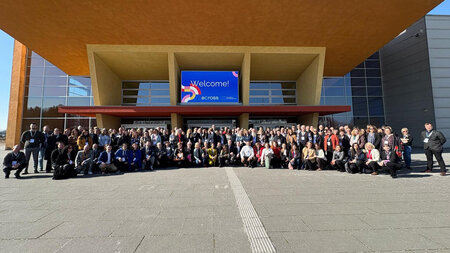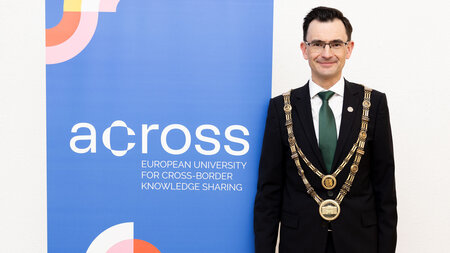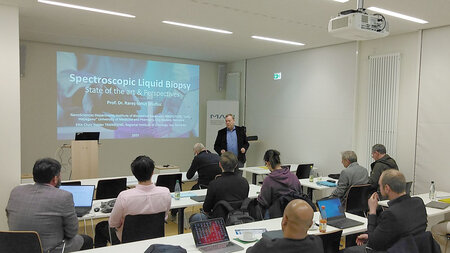Further impetus for fuel cell technology in Saxony
The project family HZwo has a new member: the cooperation project of the Department of Advanced Powertrains of the Chemnitz University of Technology and FAE Elektrotechnik Heidenau has been launched
-

Philipp Rathke (l.) from the Department of Advanced Powertrains and Felix Bemme from FAE Elektrotechnik GmbH&Co. KG work together in the “ISELKO HZwo:SYS” project. Photo: Jiři Hrdlička
The recent official kick-off of the “ISELKO HZwo:SYS – Brennstoffzellen-Batterie-Hybridsystem” project marked the beginning of the joint research project of the Department of Advanced Powertrains of the Chemnitz University of Technology and the FAE Elektrotechnik GmbH& Co. KG, Heidenau. In the course of this project, an emission-free energy supply system scalable in a wide power range will be developed by combining fuel cells and batteries to a hybrid system. The interdisciplinary consortium with a total budget of about € 600,000 has been formed in March 2016. The VDI/VDE-IT supports approx. half of the project with its so-called ZIM-Innovationsförderung (ZIM-innovations fund) with funds from the Federal Ministry for Economic Affairs and Energy (BMWi).
The research project emerged from the ZIM- cooperation network ISELKO (innovative system solutions for electrical small vehicle mobility). The technology developed in the HZwo: SYS project will not only be used for mobile applications, but also for stationary and portable solutions in the lower power range. The special feature: the fuel-cell- battery- hybrid system to be developed is a scalable hardware concept due to its modular structure. Thus, to not reinvent the wheel for every application, the software as an implementation of the operating strategy can be adapted automatically to various applications. This way, a single system concept can supply applications with different requirements for continuous and peak performances. In order to expand the range of applications even further, the system design will take rough environmental conditions such as temperatures of down to -10°C into account. The targeted utilization of the waste heat will add another benefit for customers.
The scalable approach minimizes the costs of customized systems and is the optimal compromise between standardization and individuality. The approach is intended to achieve economies of scale and pass them on to users in the early phase of commercialization of the fuel cell technology. The BMWi-funded development of fuel-cell-battery-hybrid systems significantly contributes to the extension of the application of regenerative energies. The costs of fuel-cell-battery-hybrid systems need to be decreased for the technology to become economically viable for the customer.
Prof. Thomas von Unwerth, director of the Institute for Automotive Research and head of the Department of Advanced Powertrains at the Chemnitz University is confident: “Hydrogen- fuel-cell drives will play an important role in the future electrification of automobiles. But also many other portable and mobile applications are predestined for the application of fuel cells. Especially niche markets can be an early nucleus for the establishment of hydrogen-based regenerative energy supply as the price pressure is lower than in the automotive industry. The development of fuel-cell-battery-hybrid systems for small and medium-sized performance classes will further the important scale effect for the reduction of costs. The project family HZwo is supposed to initiate the development of a value chain of the fuel cell technology also for system solutions and their producer in Saxony. With this additional project of the HZwo family, we develop technologies that can be applied in fuel-cell vehicles for the long-term development of an automotive fuel cell cluster in Saxony.”
A cost driver of the currently available fuel cell systems are stacks, whose production still involves much manual work, as well as their peripheral components which are usually only available in small quantities or as prototypes. Another large cost factor is the engineering effort, designing the customized system respectively from all individual parts.
In the course of the two-year research project, the concept and prototype of a scalable fuel cell-hybrid-platform will be developed that can be adjusted to various applications without additional development effort. “This will result in short delivery periods and minimized costs at a great degree of individualization, which in turn provides the possibility of economically viable energy supply solutions that work silently as well as emission-free and offer decisive advantages to our future customers in many areas. Petrol and diesel generators are often still in use. Aim is to replace conventional generators in relevant applications. Furthermore, our innovative systems enable the supply of electrical energy in places that currently do not allow the use of conventional systems.” says Lutz Fleck, director of the FAE Elektrotechnik GmbH& Co. KG and initiator of the research project.
At the same time, fuel-cell stacks are being developed in other projects of the HZwo family to further reduce costs which would also be beneficial to future generations of the in the energy supply system developed in the “ISELKO HZwo: SYS”. The developed technologies and the acquired know-how guarantee an early access to future markets for the involved companies in Saxony and provide a significant lead in technology.
Contact: Philipp Rathke, phone +49 371 531 34429, email philipp.rathke@mb.tu-chemnitz.de
(Translation: Alissa Hölzel)
Mario Steinebach
08.05.2017





